|
|
|
Sort Order |
|
|
|
Items / Page
|
|
|
|
|
|
|
| Srl | Item |
| 1 |
ID:
038856
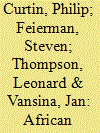

|
|
African history
/ Curtin, Philip; Feierman, Steven; Thompson, Leonard; Vansina, Jan
|
1978

|
|
|
|
| Publication |
London, Longman, 1978.
|
| Description |
xv, 612p.: mapspbk
|
| Standard Number |
0582646634
|
|
|
|
|
|
|
|
|
|
|
|
Copies: C:1/I:0,R:0,Q:0
Circulation
| Accession# | Call# | Current Location | Status | Policy | Location |
| 018200 | 960/CUR 018200 | Main | On Shelf | General | |
|
|
|
|
| 2 |
ID:
190813
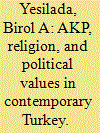

|
|
|
|
|
| Summary/Abstract |
The Justice and Development Party (AKP) came to power in 2002 with the promise of reforms to further democratic consolidation in Turkey. At that time, the AKP represented a rainbow coalition of individuals from the previous Islamist parties and many liberal democrats who were fed up with the failures of old secular political parties. The Turkish public shared their frustrations and overwhelmingly supported the AKP. Unfortunately, these reforms did not last. Today, it is indisputable that under the rule of the AKP, and more specifically, President Recep T. Erdoğan, Turkey has become an authoritarian state defined and shaped by one person. This article explores what these developments mean for the future of Turkish democracy as the country celebrates its centenary, and it includes an examination of whether Turkish political culture is supportive of such changes.
|
|
|
|
|
|
|
|
|
|
|
|
|
|
|
|
| 3 |
ID:
169033
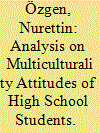

|
|
|
|
|
| Summary/Abstract |
This study explores the links between multiculturality attitudes displayed by high school students and their ethnic identity, religious beliefs, self-identification, and place of residence. The study is based on questionnaires from 2823 students in 17 cities in seven geographical regions across Turkey. A five-dimension Multiculturality Attitude test was used, which consists of 21 items and was developed by the authors. The data were analyzed with the non-parametric tests Kruskal–Wallis and Mann–Whitney-U. According to the results, there are statistically significant differences across all categories of the scale.
|
|
|
|
|
|
|
|
|
|
|
|
|
|
|
|
| 4 |
ID:
132774
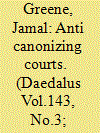

|
|
|
|
|
| Publication |
2014.
|
| Summary/Abstract |
Within U.S. constitutional culture, courts stand curiously apart from the society in which they sit. Among the many purposes this process of alienation serves is to "neutralize" the cognitive dissonance produced by Americans' current self-conception and the role our forebears' social and political culture played in producing historic injustice. The legal culture establishes such dissonance in part by structuring American constitutional argument around anticanonical cases: most especially "Dred Scott v. Sandford," "Plessy v. Ferguson," and "Lochner v. New York." The widely held view that these decisions were "wrong the day they were decided" emphasizes the role of independent courts in producing them and diminishes the roles of culture in creating them and of social movements in overcoming them. This essay argues for approaching these decisions as ordinary products of political culture rather than extraordinary products of judicial malfeasance. Doing so honors those who struggled for progress and may invigorate our political imagination in the present.
|
|
|
|
|
|
|
|
|
|
|
|
|
|
|
|
| 5 |
ID:
140922
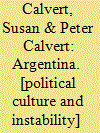

|
|
|
|
|
| Edition |
1st ed.
|
| Publication |
Hampshire, Macmillan Press Ltd, 1989.
|
| Description |
xiv, 327p.: plates, maphbk
|
| Standard Number |
0333451651
|
|
|
|
|
|
|
|
|
|
|
|
Copies: C:1/I:0,R:0,Q:0
Circulation
| Accession# | Call# | Current Location | Status | Policy | Location |
| 031164 | 982/CAL 031164 | Main | On Shelf | General | |
|
|
|
|
| 6 |
ID:
091102
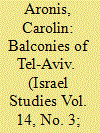

|
|
|
|
|
| Publication |
2009.
|
| Summary/Abstract |
Balconies have an important role in the social life of Tel-Aviv. The article explores different aspects of urban politics and the cultural history of balconies, and in particular sheds light on façade balconies in Tel-Aviv as liminal places between the private sphere and the public arena. Focusing on socio-cultural and architectural characteristics, the study presents, from an historical perspective, changes of style and use of the balconies of Tel-Aviv and examines them as sites of dispute between residents and authorities.
|
|
|
|
|
|
|
|
|
|
|
|
|
|
|
|
| 7 |
ID:
103559
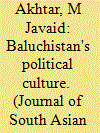

|
|
|
| 8 |
ID:
146714
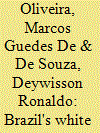

|
|
|
|
|
| Contents |
After Honduras, Paraguay, Peru and Argentina, Brazil now has a new conservative government intent on correcting the left leaning course of the previous administration led by the Workers’ Party. This paper explains the reasons for the disenchantment of the electorate with the policies of President Dilma Rousseff in a climate of economic crisis and widespread corruption. It argues that, taking advantage of the government’s weakness, the old business elites and landowning oligarchy have retaken power in a white coup in order to restore the status quo ante and preserve their long held dominance by using the pretext of corruption of which however they are the main practitioners and beneficiaries.
|
|
|
|
|
|
|
|
|
|
|
|
|
|
|
|
| 9 |
ID:
150551
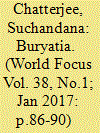

|
|
|
|
|
| Summary/Abstract |
The new narratives in Buryatia indicate both continuities and discontinuities—on the one hand there is an affirmation of Siberia’s Russian legacy and an understanding of multiple narratives of encounter and resilience. On the other hand, there is recognition of the mechanisms of integration in the Buryat space: be it a pan-Mongol domain, a shamanist tradition, or a Buddhist spirituality.
|
|
|
|
|
|
|
|
|
|
|
|
|
|
|
|
| 10 |
ID:
132271
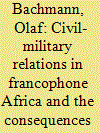

|
|
|
|
|
| Publication |
2014.
|
| Summary/Abstract |
The Building Security Overseas Strategy is at its core an 'Intervention to end all Interventions' - from a Western as well as an African perspective. Two of its main pillars are security sector reform in specific countries and systematic support to the development of the African Peace and Security Architecture. This article addresses the question why such efforts have met little success in francophone Africa. It argues that the failure of Western advisers to understand the sociological dynamics of African armed forces, shaped by a political culture based on personal loyalty to the leader, is at the root of the problem. In that context, the Huntingtonian-type distinction between the civilians and the military does not apply as military and civilians act in concert within common clientelism systems. As a result of the curtailing of the state-formation experience in most African countries, the military never had to demonstrate its performance as a state builder, nor did it have to bargain its legitimacy against the support of the citizens. Partnership in that context will remain a misnomer, at least until African military can credibly demonstrate commitment to state-building grounded in a broad-based social contract.
|
|
|
|
|
|
|
|
|
|
|
|
|
|
|
|
| 11 |
ID:
145908
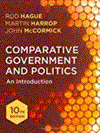

|
|
|
|
|
| Edition |
10th ed.
|
| Publication |
London, Palgrave, 2016.
|
| Description |
xv, 366p.pbk
|
| Standard Number |
9781137528360
|
|
|
|
|
|
|
|
|
|
|
|
Copies: C:1/I:0,R:0,Q:0
Circulation
| Accession# | Call# | Current Location | Status | Policy | Location |
| 058716 | 320.3/HAG 058716 | Main | On Shelf | General | |
|
|
|
|
| 12 |
ID:
072161
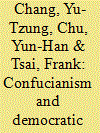

|
|
|
| 13 |
ID:
123860
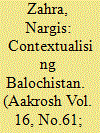

|
|
|
| 14 |
ID:
101192
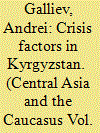

|
|
|
| 15 |
ID:
164967
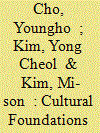

|
|
|
|
|
| Summary/Abstract |
This study takes a cultural approach to examine the unstable and contentious nature of Korean democracy. Analyzing an original nationwide survey conducted in 2015, we find that the democratic and participatory culture of the Korean people underlies Korean democracy. This finding suggests substantial tension between the participatory orientation of the public and Korean representative democracy.
|
|
|
|
|
|
|
|
|
|
|
|
|
|
|
|
| 16 |
ID:
163914
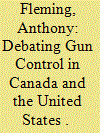

|
|
|
|
|
| Summary/Abstract |
The weakness of the antigun lobby in the United States is attributed to the “collective action problem” of trying to mobilize “free riders” behind a public purpose. But the Coalition for Gun Control emerged in Canada to successfully lobby for the Firearms Act of 1995. If the “collective action problem” is not limited to the United States, then are its effects “mediated” by political culture? To address this research question, we content analyze (1) media coverage, (2) party platforms, (3) presidential, and (4) ministerial rhetoric. Three frames represent “restrictive” gun policies that ban or regulate firearms, “punitive” gun policies that penalize the person for the unlawful use of firearms, or “lenient” gun policies that encourage gun ownership and gun rights. Marked differences in framing the gun debate help explain why an antigun coalition emerged in Canada but not the United States.
|
|
|
|
|
|
|
|
|
|
|
|
|
|
|
|
| 17 |
ID:
163759
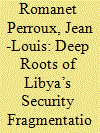

|
|
|
|
|
| Summary/Abstract |
Six years after the 2011 revolution that toppled the Gaddafi regime, the political transition in Libya is at a standstill. The fragmented security landscape fuels chronic local conflicts, lawlessness, and insecurity, and paralyzes the political transition with destabilizing consequences on its neighbors. What explains the rapid, profound, and lasting security fragmentation that affected post-Gaddafi Libya? Notwithstanding the manifest failures of the international intervention during and after the 2011 conflict, this article argues that the security fragmentation in post-Gaddafi Libya is deeply rooted in domestic economic, cultural, and political factors. In particular, the Libyan economy offers almost no employment opportunities, and the country lacks a unitary government and functioning state institutions that it needs to redistribute its oil wealth. Under these circumstances, Libyans attempt to cope with economic hardship, insecurity, and lawlessness by turning towards their family, tribe, neighborhood, or ethnic group, thereby fueling the fragmentation of security. Libya’s current security fragmentation and instability can be seen as part of the messy historical process of state formation. During this phase, political and security agreements are brokered and institutionalized through localized processes of rebel governance whose realm of possible arrangements are determined by contextual economic, political and cultural constraints.
|
|
|
|
|
|
|
|
|
|
|
|
|
|
|
|
| 18 |
ID:
032000
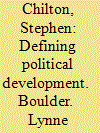

|
|
|
|
|
| Publication |
Boulder, Lynne Rienner Publisher, 1988.
|
| Description |
vii, 133p.
|
| Series |
GSIS monography series in world affairs
|
| Standard Number |
1555870864
|
|
|
|
|
|
|
|
|
|
|
|
Copies: C:2/I:0,R:0,Q:0
Circulation
| Accession# | Call# | Current Location | Status | Policy | Location |
| 029301 | 306.2/CHI 029301 | Main | On Shelf | General | |
| 029749 | 306.2/CHI 029749 | Main | On Shelf | General | |
|
|
|
|
| 19 |
ID:
095153
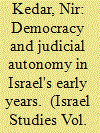

|
|
|
|
|
| Publication |
2010.
|
| Summary/Abstract |
The article investigates the question of judicial autonomy in the State of Israel during the first five years of independence. It examines to what extent the government and the Knesset were involved in the procedure of appointing Supreme Court judges, and then discusses the involvement of these authorities in the courts' ongoing work. An examination of the full range of evidence from the period leads to the conclusion that, since the establishment of Israel, there were no unsuitable attempts to influence judges to issue unfair rulings or to restrict their autonomy in other ways. The mistaken notion that judges in the early years of Israel were not respected or appreciated and that their autonomy was in practice flawed should therefore be abandoned, acknowledging the efforts of the first Israelis to reconcile the complex principles of democracy and the rule of law
|
|
|
|
|
|
|
|
|
|
|
|
|
|
|
|
| 20 |
ID:
129087
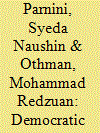

|
|
|
|
|
| Publication |
2014.
|
| Summary/Abstract |
In recent years efforts have been made to improve governance by ensuring institutional performance and policing for greater transparency to sustain liberal democracy in Bangladesh and elsewhere. Since gaining independence in 1971, The People's Republic of Bangladesh has been driven by internal power struggles and economic chaos, while attempting to develop a democratic society. A predominately Islamic country, Bangladesh's representative government is battling poverty and rampant corruption. Although this study appreciates what Bangladesh has achieved so far, it seeks to deviate from the general trend that romanticizes Bangladesh's democracy and its recent connection with new governance parameters. This study attempts to identify some of the major paradoxes that Bangladesh's democracy is faced with. All these factors will be analyzed in the context of a contemporary notion of governance and democracy in Bangladesh.
|
|
|
|
|
|
|
|
|
|
|
|
|
|
|
|
|
|
|
|
|